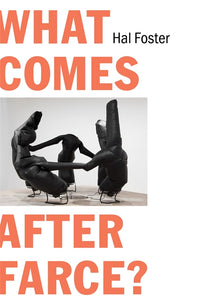Life in Lockdown: Hal Foster
Hal Foster on Alexander Kluge, emails from friends, and the problem with pandemic diaries.

The best things I have read while hunkered down are some emails from friends—best as in critical, hard to shake. Here are a couple of examples.
First, from an art historian in the UK, about pronouncements on the pandemic from left intellectuals: “I couldn’t imagine there was a way to make us even less sociable and more serial, and then this virus came along. Still, I can’t stomach the polemics, whether it’s Agamben at his most fatalistic (‘We’re all bare life now!’) or Žižek at his most paradoxical (‘We achieve solidarity through separation!’).”
Second, from a novelist on the West Coast, on navel-gazing at home while others in hospitals can’t breathe: “All these writers with their pandemic diaries. It’s not a good genre. And it’s a kind of lie. A writer's life is barely different. In my opinion, unless you’re out there helping people in extremis, STFUP.” I responded that not only is ‘I’ especially tricky now, but so too is ‘we’—as in “We’re all in this together,” when manifestly, we aren’t. To which my friend replied: “For Sartre the writerly ‘we’ is almost always in bad faith. Smarmy reification that pretends to give subjectivity to others, while merely foisting upon them one's own outlook. That it ignores class antagonisms is putting it lightly and generously. The alternative is not ‘I’ but genuine curiosity about other people.”
And yet the single passage that has moved me the most during this suspended time is personal (or at least phenomenological) in nature. It comes from Dispatches from Moments of Calm (2010) by Alexander Kluge (with images by Gerhard Richter), and though it appeared long before the pandemic, “its weird mixture of intimacy and distance”––to quote another writer friend—“is painfully right for a moment when the social obligation is to have no social life”:
He tries calling his son. No Answer. A period of waiting. Then his daughter, and then his wife. They can’t be reached on their mobile phones. A pause in his life. He can still feel the urgency of the day’s demands in his body but he has no one he can talk to.
The view from the window shows a group of trees, dark green in the evening light. There is still light in their topmost branches, the last parting traces of the day. On a tea trolley (two generations older than its observer) a glass candlestick supports four candles whose colours vary between blue and pale violet, depending on the light coming from the window. If the waiting man were to die soon, it would continue to stand there for a while; since there was never any reason for putting it by the window in the first place, there is also scarcely any reason for moving it. The evenings I have yet to see are numbered. Most will pass without my noticing the gradual fading of the light, because I won’t be having to wait, I will be in the company of others, or
I will be busy and will be able to reach the people I love. So this short sequence of minutes is, perhaps, a unique period of time before speeches that will be held at the end.The colour of life outside the window has already changed. The light illuminating the edges of the trees has gone. The unused candles have lost their blue and violet colours. Right in front of me a collection of pencils and two sharpeners stand next to a lamp which will soon be switched on. There’s a lot to do. Now I have to get something to eat.
Hal Foster is the author of What Comes After Farce? and Townsend Martin Professor of Art and Archaeology at Princeton University. A co-editor of October magazine and books, he is the editor of The Anti-Aesthetic, and the author of Design and Crime, Recodings, The Return of the Real, Compulsive Beauty and The Art-Architecture Complex.

